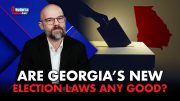
A federal appeals court ordered Kentucky Governor Andy Beshear to pay over $270,000 in legal fees for three people who sued him after he threatened them with prosecution for attending church during the early months of the Covid-19 pandemic.
On Monday, the Sixth Circuit Court of Appeals upheld a district-court decision awarding $272,143 in attorney’s fees to plaintiffs Theodore Roberts, Randall Daniel, and Sally O’Boyle. The plaintiffs had attended the 2020 Easter service at Maryville Baptist Church, two days after the Democratic governor issued a press release warning that state police would be “recording the license plate numbers of any vehicle seen at” church services, after which the owners would be required “to self-quarantine for 14 days,” forbidden to leave either the county or the state. Failure to comply constituted a “misdemeanor violation of the emergency orders issued by the Governor and Kentucky Department for Public Health.”
Roberts, Daniel, and O’Boyle were among those receiving such citations. But rather than meekly acquiescing to Beshear’s unconstitutional dictates — especially since he had publicly targeted churches while allowing supermarkets and liquor stores to remain open — they took him to court. The district court refused their request for a preliminary injunction, but the Sixth Circuit granted it.
“The unexplained breadth of the ban on religious services, together with its haven for numerous secular exceptions, cannot co-exist with a society that places religious freedom in a place of honor in the Bill of Rights: the First Amendment,” the court wrote.
Beshear later relaxed his orders, after which the state Legislature placed limitations on his ability to issue further ones. The district court then dismissed the plaintiffs’ case as moot, but granted their request for attorney’s fees. Beshear appealed, largely on technicalities.
First, he argued that the plaintiffs were not “prevailing parties” in the case since it was dismissed as moot. The court, however, pointed out that although obtaining a preliminary injunction usually “does not suffice” to make a plaintiff the prevailing party, it “may well suffice if it mainly turns on the likelihood-of-success inquiry and changes the parties’ relationship in a material and enduring way.”
The court declared:
Gauged by these principles, the congregants prevailed. The federal courts enjoined the limitations on religious gatherings and interstate travel. Both injunctions changed the legal relationship between the congregants and Governor Beshear because they stopped the Governor from enforcing his orders and allowed the congregants to act in ways that he had “previously resisted.” That is “assuredly” a material, court-ordered change. [Citations deleted.]
The injunctions, though preliminary, also qualify as enduring. The nature of the injunctions, the longevity of the relief, and the irrevocability of the relief all point in the same direction.
In every meaningful sense, then, the plaintiffs prevailed.
Beshear still contended that they did not, for a variety of absurd reasons that the court soundly rejected. For instance, Beshear claimed (in the court’s words) “that the congregants did not prevail because Kentucky voluntarily changed the orders after the preliminary injunctions [were] issued,” which is like saying Mom didn’t prevail when she caught you with your hand in the cookie jar because you then put the purloined pastry back. He also argued that fees should not be awarded “because none of the remaining defendants prosecutes misdemeanors,” to which the court responded that Beshear “ignores evidence that he ‘actually enforced’ the orders,” “does not grapple with the possibility that he had some authority over prosecutions,” and “cites nothing for the idea that a plaintiff may prevail against a rule’s enforcer but not its promulgator.”
Congressman Thomas Massie (R-Ky.) congratulated the plaintiffs, tweeting that Beshear “infringed civil rights when he shut down churches. Then he wasted tax dollars defending his behavior.”
He will now be shelling out even more taxpayer dollars to pay for his behavior, a point that plaintiff Roberts addressed in his own tweet.
“I know a lot of people who are outraged that the TAXPAYER is on the hook for ANDY’S constitutional violation. I share this outrage, but this outrage must be aimed at Beshear,” he wrote. “If the people of Kentucky want to quit being taxed to pay for these court judgments, Kentucky MUST elect a governor who will actually follow the constitution.”




